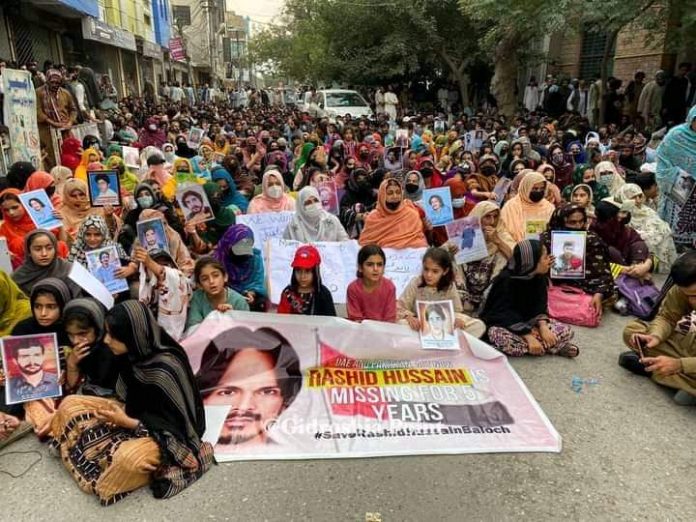A rally was held in Quetta, the capital of Pakistan-occupied Balochistan, on Sunday by the family of Rashid Hussain, who has been missing for over five years. The protest was joined by a large number of political activists and families of other forcibly disappeared persons, highlighting the ongoing crisis of enforced disappearances in the region.
Participants carried pictures of their missing loved ones and banners, chanting slogans against enforced disappearances and the genocide of the Baloch people.
Rashid Hussain’s mother, who has been fighting for her son’s return, revealed that her son was arrested by secret agencies of the United Arab Emirates on December 26, 2018, and subsequently transferred to Pakistan. She said that her son was forcibly disappeared from the UAE at the behest of the Pakistan Army, with both Pakistan and UAE intelligence agencies were involved in the abduction.
Ongoing Crisis of Enforced Disappearances
For the past five years, Rashid Hussain’s family has been seeking justice, approaching courts and commissions tasked with investigating missing persons. However, instead of finding justice, they have faced harassment, with their legal cases being dismissed by the courts. The situation remains grim, as the High Court recently halted hearings on their case and postponed it indefinitely.
The family has made an urgent appeal to human rights organizations and the international community, urging them to question the Pakistan authorities about Rashid Hussain’s whereabouts and to help bring an end to their prolonged agony.
Meanwhile, another enforced disappearance was reported in Awaran district, where Khan Muhammad, son of Wahid Bakhsh, was taken into custody by the Pakistan military on August 15 from the Jhao Kohru area. His family, who has received no information about his whereabouts, is appealing to political, social, and human rights organizations to assist in his recovery.
These incidents are part of a disturbing pattern of enforced disappearances in Pakistani-occupied Balochistan, where such abductions and extrajudicial actions have been used as tools of oppression since the region’s forcible capture in 1948. While the area’s resources have been exploited, the local population continues to face severe human rights abuses, including enforced disappearances, marginalization, and extrajudicial killings, as a means of maintaining control over the Baloch community.

